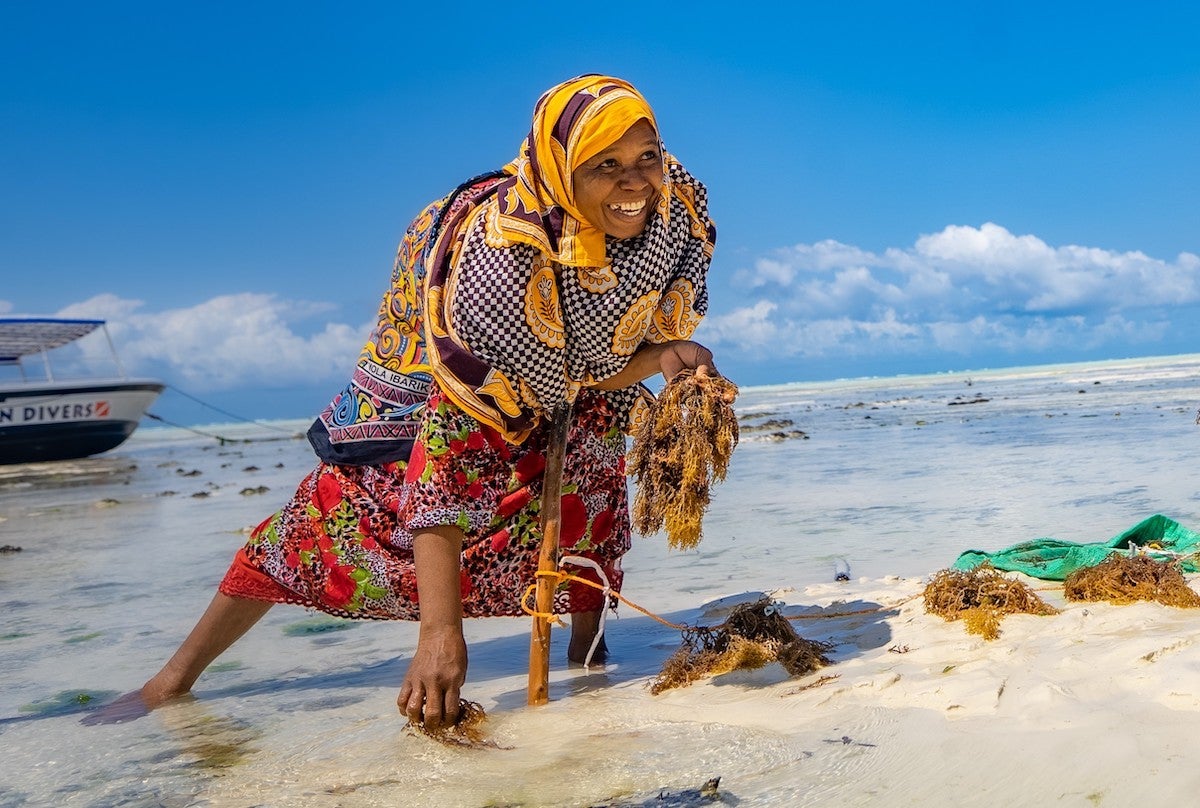Putting the needs of women first in the Zanzibar Blue Economy agenda
Date:
On a regular day, Pavu Mcha Khamis makes a two-hour trip from one area of Tanzania’s island of Zanzibar to another, meeting with seaweed farmers in her capacity as the head of the Zanzibar Sea Moss Farmer’s Cooperative. She listens to their concerns, tries to resolve what she can, and escalates what she can’t to the relevant authorities.
Ms. Khamis has been in the seaweed industry ever since she was a young secondary school student. She started as a farmer, following in her mother’s footsteps, and later became the chair of the Cooperative, a role she continues to hold today.
For many women, sea moss cultivation, which started to grow in popularity in the mid-90s, has been a steady source of income, and they now form the majority of the labour force.
“All the women have a common dream, and that is to grow – their yields, their status and the status of their communities. They want to be able to make a significant contribution to their families’ livelihoods, but many challenges still stand in the way,” says Ms. Khamis.
Speji Haji Usi, who lives in Jambiani, a popular tourist area in Southern Zanzibar, has farmed sea moss for over 20 years and works as a casual labourer for a hotel. In the two decades since she started farming, she says the availability of tools has always been a challenge.
“It is very hard to find storage facilities and the tools we need to grow our farming business. We can barely afford it,” she says.

Environmental changes have also adversely impacted sea moss yields, according to Ms. Usi, “The sea moss just doesn’t last as long as it used to, mainly due to higher sea temperatures in shallow water and stronger winds that cause the seaweed to break.”
The amount of income sea moss farmers are able to earn from selling sea moss is also insufficient, hindering the farmers’ ability to grow their businesses, and as the best quality sea moss is planted in deep waters, women are left at a disadvantage because the majority in the area don’t know how to swim.
“We have to pay men to do it for us if we want to farm in deep waters, something we can’t always afford to do,” Ms. Usi explains.
The sea moss industry forms part of Zanzibar’s blue economy, which prioritizes the use of maritime and marine resources to support inclusive and sustainable economic growth. With ocean-based activities contributing 29 per cent to Zanzibar’s GDP and 33 per cent of its labour force – where women form the majority – ensuring women’s needs are taken into account in the blue economy agenda has been a key priority for the government.
Since 2020, UN Women has supported the Government of Zanzibar to ensure gender perspectives are integrated into Zanzibar’s blue economy policies, strategies and plans, and thanks to support from the Government of Norway, this led to the development of the first Blue Economy Gender Strategy and Action Plan in 2022.
“The Strategy aims at addressing environmental and systemic gender inequalities, discriminatory social norms, and barriers that women face in the blue economy sector, and identifying new opportunities for women’s economic and social participation,” said UN Women Tanzania Representative, Ms. Hodan Addou.
UN Women has also supported the Zanzibar Government to integrate gender perspectives in the Fisheries Policy of 2022, is working with UNDP and UNEP to support the development of Zanzibar’s Marine Spatial Planning Process, and is implementing various initiatives geared towards enhancing the participation of women in blue economy sectors through a joint programme undertaken with FAO, IFAD and WFP.
“Through these different initiatives, our goal is to realize a participatory, social and gender-inclusive blue economy that aims to improve the livelihoods of women and youth and reduce gender inequalities.”
As a key stakeholder giving voice to women sea moss farmers, Pavu Mcha Khamis has been integral in ensuring that the government understands sea moss farmers’ challenges and opportunities.
“We need better regulation of prices, better tools for farming, support to be able to engage in off-shore seaweed farming, and dedicated areas for women to farm and dry the sea moss,” says Ms. Khamis, adding that women also need added skills and resources to add value to their seaweed crops, such as to bottle sea moss or produce soap and other cosmetic products.
Through her participation in the gender strategy consultations, Ms. Khamis is hopeful that soon, her efforts will begin to yield results.
“We have made a giant step forward for women, with many of the things we have been asking for reflected in the strategy. This is the foundation we need for transformational change to take place. In time, we are confident that we will see the positive impact on the lives of the women that are actively working to grow this industry.”